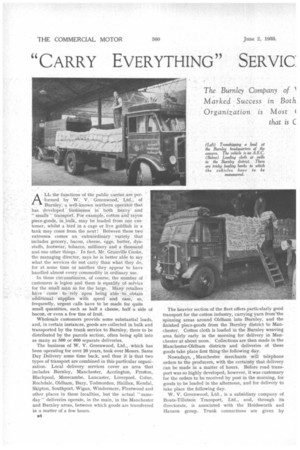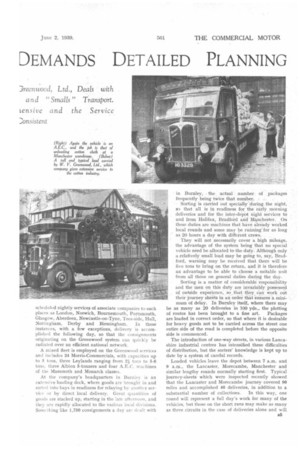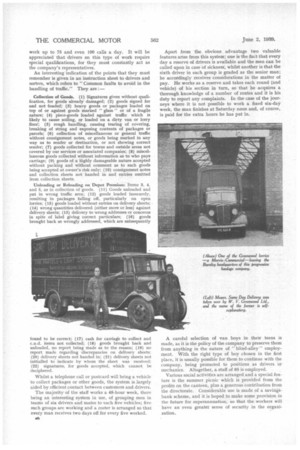"CARRY EVERYTHING" SERVIC DEMANDS DETAILED PLANNING
Page 38

Page 39

Page 40

If you've noticed an error in this article please click here to report it so we can fix it.
ALL the functions of the public. carrier are per'formed by W. V. . Greenwood, Ltd., of . Burnley; a well-known northern operator that his developed businesses in both heavy and " smalls " transport. For example, cotton and rayon piece-goods, in hulk, may be loaded from one customer, whilst a bird in a cage or live goldfish in a tank may comb from the next! Between these two extremes comes an extraordinary variety that includes grocery, bacon, cheese, eggs, butter, dyestuffs, footwear, tobacco, millinery and a thousand and one other things. In fact, Mr. Granville Cooke, the managing director, says he is better able to say what the services do not carry than what they do, for at some time or another they appear to have handled almost every commodity in ordinary use. In these circumstances, of course, the number of customers is legion and there is equality of service for the small man as for the large. Many retailers have ' come to rely upon being able . to obtain 'additional supplies with speed and ease, so, frequently, urgent calls have to be made for quite small quantities, such as half a cheese, half a side of
bacon, or even a few tins of fruit. . Wholesale customers provide some substantial loads, and, in certain instances, goods are collected in bulk and transported by the trunk service to Burnley, there to be distributed by the parcels section, often being split into as many as 500 or 600 separate deliveries.
The business of W. V. Greenwood, Ltd., which has been operating for over 20 years, took over Messrs. Same Day Delivery some time back, and thus it is that two types of transport are combined in this particular organization. Local delivery services cover an area that includes Burnley, Manchester, Accrington, Preston, Blackpool, Morecambe, Lancaster, Liverpool, Colne, Rochdale, Oldham, Bury, Todmorden, Halifax, Kendal, Skipton, Southport, Wigan, Windermere, Fleetwood and other places in these localities, but the actual " sameday" deliveries operate, in the main, in the Manchester and Burnley areas, between which goods are transferred in a matter of a few hours.
84 The heavier section of the fleet offers particularly good transport for the cotton industry, carrying yarn from-the spinning areas around Oldham into Burnley, and the finished piece-goods from the Burnley district to Manchester. Cotton cloth is loaded in the Burnley weaving area fairly early in the morning for delivery in Manchester at about noon. Collections are then made in the Manchester-Oldham districts and deliveries of these goods take place first thing the following day.
Nowadays, Manchester merchants will telephone orders to the producers, with the certainty that delivery can be made in a matter of hours. Before road transport was so highly developed, however, it was customary for the orders to be received by post in the morning, for goods to be loaded in the afternoon, and for delivery to take place the following day.
W. V. Greenwood, Ltd.., is a subsidiary company of Bouts-Tillotson Transport, Ltd., and, through its directorate, is associated with the Holdsworth and Hanson group. Trunk connections are given by
scheduled nightly services of associate companies to such places as London, Norwich, Bournemouth, Portsmouth, Glasgow, Aberdeen, Newcastle-on-Tyne, Tees-side, Hull, Nottingham, Derby and Birmingham. In these instances, with a few exceptions, delivery is accomplished the following day, so that the consignments originating on the Greenwood system can quickly be radiated over an efficient national network.
A mixed fleet is employed on the Greenwood services and includes 24 Morris-Commercials, with capacities up to 5 tons, . three Leylands ranging from 21 tons to 5-6 tons, three Albion 5-tonners and four A.E.C. machines of the Mammoth and Monarch classes.
At the company's headquarters in Burnley is an extensive loading deck, where goods are brought in and sorted into bays in readiness for relaying by another service or by direct local delivery. Great quantities of goods are stacked up, starting in the late afternoon, and they are rapidly allocated to the various local divisions. Something like 1,750 consignments a day are dealt with
in Burnley, . the actual , number. of .packages frequently being twice that number. .
Sorting is carried out specially' during, the night, so that all is in readiness for the early morning deliveries and for the inter-depot night services to and from Halifax, Bradford arid Manchester. On these duties are machines that have already worked local rounds and some may be runningfor as long as 20 hours a day with different crews.
They will not necessarily cover a high mileage, the advantage of the system being that no special vehicle need be allocated to the duty. Although only a relatively small load may be going to, say, Bradford, warning may be received that there will be five tons to bring on the return, and it is therefore an advantage to be able to choose a suitable unit from all those on general duties during the day.
Sorting is a. matter of considerable responsibility and the men on this duty are invariably possessed of outside experience, so that they can work out their journey sheets in an order that 'ensures a minimum of delay. In Burnley itself, where there may be as many as 20 deliveries in 100 yds., the plotting of routes has been brought to a fine art. Packages are loaded in correct order, so that where it is desirable for heavy goods not to be carried across the street one entire side of the road is completed before the opposite side is commenced.
The introduction of one-way streets, in various Lancashire industrial centres has intensified these difficulties of distribution, but the sorters' knowledge is kept up to date by a system of careful records.
Loaded vehicles leave the depot between 7 a.m. and 9 a.m., the Lancaster, Morecambe, Manchester and similar lengthy rounds normally starting first. Typical journey-sheets which were inspected recently showed that the Lancaster and Morecambe journey covered 90 miles and accomplished 40 deliveries, in addition to a substantial number of collections. In this way, one round will represent a full day's work for many of the vehicles, but those on the short runs may make as many as three circuits in the case of deliveries alone and will work up to 75 and even 100 calls a day. It will be appreciated that drivers on this type of work require special qualifications, for they must constantly act as the company's representatives.
An interesting indication of the points that they must remember is given in an instruction sheet to drivers and sorters, which refers to "Common faults to avoid in the handling of traffic." They are :
Collection of Goods. (1) Signatures given without qualification, for goods already damaged; (2) goods signed for and not -loaded; (3) heavy goods or packages loaded on top of or against goods marked " glass " or of a fragile nature; (4) piece-goods loaded against traffic which is likely to cause soiling, or loaded on a dirty van or lorry floor; (5) rough handling, causing tearing of covering, breaking of string and exposing contents of packages or parcels; (6) collection of miscellaneous or general traffic without consignment notes, or goods being marked in any way as to sender or destination, or not showing correct sender; (7) goods collected for towns and outside areas not covered by our services or associated companies; (8) miscellaneous goods collected without information as to who pays carriage; (9) goods of a highly damageable nature accepted without packing and without comment as to such goods being accepted at owner's risk only; (10) consignment notes and collection sheets not handed in and entries omitted from collection sheets.
Unloading or Reloading on Depot Premises: Items 3, 4, and 5, as in collection of goods. (11) Goods unloaded and put in wrong traffic area; (12) goods loaded insecurely, resulting in packages falling off, particularly on open lorries; (13) goods loaded without entries on delivery sheets; (19) wrong quantities delivered (either more or less) against delivery sheets; (15) delivery to wrong addresses or concerns in spite of label giving correct particulars; (16) goods brought back as wrongly addressed, which are subsequently found to be correct; (17) cash for carriage to collect and c.o.d. items not collected; (18) goods brought back and unloaded, no report being made as to the reason; (19) no report made regarding discrepancies on delivery sheets; (20) delivery sheets not handed in; (21) delivery sheets not initialled to indicate by whom the sheet was received; (22) signatures, for goods accepted, which cannot be deciphered.
Whilst a telephone call or postcard will bring a vehicle to collect packages or other goods, the system is largely aided by efficient contact between customers and drivers.
The majority of the staff works a 48-hour week, there being an interesting system in use, of grouping men in teams of six drivers and mates to each five vehicles; five such groups are working and a roster is arranged so that every man receives two days off for every five worked.
ab
Apart from the obvious advantage two valuable features arise from this system; one is the fact that every day a reserve of drivers is available and the men can be called upon in case of sickness, whilst another is that the sixth driver in each group is graded as the senior man; he accordingly receives considerations in the matter of pay. He works as a reserve and takes each round (and vehicle) of his section in turn, so that he acquires a thorough knowledge of a number of routes and it is his duty to report any complaints. In the case of the journeys where it is not possible to work a fixed six-day week, the man finishes at Saturday noon and, of course, is paid for the extra hours he has put in.
A careful selection of van boys in their teens is made, as it is the policy of the company to preserve them from anything in the nature of " blind-alley" employment. With the right type of boy chosen in the first place, it is usually possible for them to continue with the company, being promoted to positions as drivers or mechanics. Altogether, a staff of 85 is employed.
Various social activities are arranged and a special feature is the summer picnic which is provided from the profits on the canteen, plus a generous contribution from the directorate. Considerable use is made of a savingsbank scheme, and it is hoped to make some provision in the future for superannuation, so that the workers will have an even greater sense of security in the organization.












































































